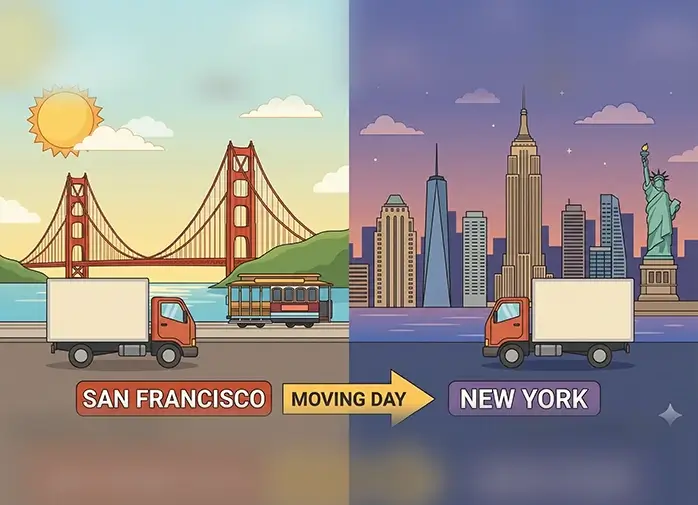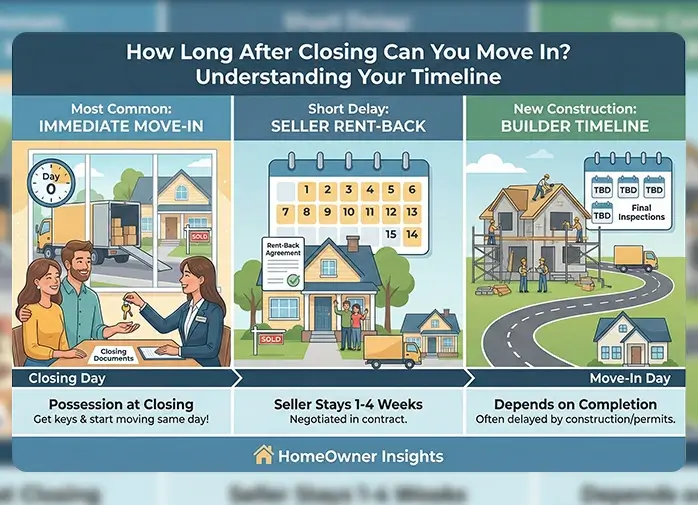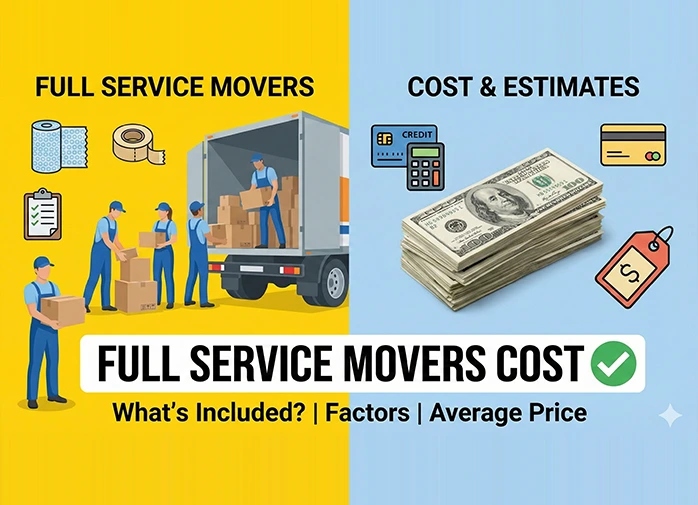To help maintain VanlinesMove.com and keep our resources free for users, we receive compensation from service providers featured on our site. This compensation comes from two primary sources: paid placements, which affect the order and visibility of providers’ offers, and affiliate links that may generate commissions when clicked. Not all providers in the market are included.
While this compensation influences placement, it does not impact our editorial content or recommendations. The information provided is for general informational purposes only and should not be taken as legal, financial, or professional advice. We recommend conducting thorough research and consulting experts before making any relocation decisions. For more details, please refer to our Terms of Use and Privacy Policy.

Moving to Richmond in 2025?
Complete Moving Guide
This is a complete guide for Moving to Richmond.
Get all the information you need to know about moving to Richmond.

Planning to move to Richmond?
Richmond is a city in Virginia that is steeped in history and rich culture. If you are planning to move there, learn about it in detail to plan your move accordingly. The cost of living in Richmond is generally affordable, and housing tends to be more budget-friendly. The city has significant ties to the Revolutionary and Civil Wars. The James River in Richmond offers several opportunities for outdoor recreation. The city experiences all four seasons, with hot, humid summers and moderately cold winters. The city's economy is growing with diverse job opportunities in different sectors, including finance, technology, and healthcare. Such information, along with relevant statistics, is available in this moving guide-
 Quick Facts About Richmond
Quick Facts About Richmond  Top Reasons To Move To Richmond
Top Reasons To Move To Richmond  Pros And Cons Of Living In Richmond
Pros And Cons Of Living In Richmond  Best Neighborhoods In Richmond
Best Neighborhoods In Richmond  Cost Of Living In Richmond
Cost Of Living In Richmond  Job Market In Richmond
Job Market In Richmond  Major industries in Richmond
Major industries in Richmond  Education System in Richmond
Education System in Richmond  Transportation And Navigation In Richmond
Transportation And Navigation In Richmond  Things To Do In Richmond
Things To Do In Richmond  Taxes In Richmond
Taxes In Richmond  Insurance Required In Richmond
Insurance Required In Richmond
Quick Facts of Richmond
Some interesting things to learn about Richmond-
- Richmond served as the capital of the Confederate States of America during the Civil War.
- The city is home to a diverse collection of breweries.
- Hollywood Cemetery is the final resting place of two U.S. presidents and several Confederate leaders.
- The city was home to Maggie L. Walker, the first African American woman to charter a bank in the United States.
- The “Fan” district is a neighborhood known for its fan-like street layout.
Top reasons to move to Richmond
A move can be challenging and might discourage you. But if you found some strong reasons to move to a city like Richmond, your transition will be easy-

- Cost of living - The cost of living in Richmond is generally affordable and lower than the national average. Lower cost of living allows the residents to enjoy a relaxed comfortable life in urban areas.
- Job Market - The economy of the city is diverse and growing. There are several sectors including finance, healthcare, education, and more that provide ample employment opportunities to the professionals.
- Education - The city is home to several well-regarded universities and other educational institutions such as Virginia Commonwealth University (VCU).
- Culture and Arts - Richmond is home to several museums, galleries, and music venues. It offers diverse cultural experiences and has several examples of artistic offerings including The Richmond Ballet.
- Outdoor recreation - The city has James River flowing through it and provides ample opportunities for outdoor recreation including hiking, biking, and more.
- Neighborhoods - There are various types of neighborhoods with its unique character.
- Food Scene - The culinary scene in the city is diverse and exciting. You can explore a wide range of cuisines from Southern cuisine to international flavors.
Pros & Cons of Living in Richmond
Lifestyle in Richmond has some pros and cons, so before you move there explore them and be prepared-

| Pros of Living in Richmond | Cons of Living in Richmond |
|---|---|
| The cost of living is affordable and offers budget-friendly housing options | Richmond experiences traffic congestion during peak hours |
| The city is steeped in rich history and has a vibrant arts scene | Public transportation in the city is somewhat limited |
| The city is home to the James River and is surrounded by parks and green spaces | Summers are hot and humid in the city, which can be difficult for some people |
| The location of the city offers convenient access to East Coast cities | The city can be challenging for people with allergies |
| The city has a strong sense of community | There are several areas in the city with higher crime rates |
Best Neighborhoods in the Richmond
Moving to a new city and finding a safe and helpful neighborhood is challenging. But, Richmond is known for its neighborhoods with a tight-knit community. These neighborhoods will help you settle in new surroundings and connect with the community. Here are some popular neighborhoods in the city-

- The Fan District - This neighborhood is known for its beautiful architecture, walkability, and vibrant atmosphere. This location is very popular with young professionals and families. You can explore bars, restaurants, and shops in the locality.
- Church Hill - The neighborhood is one of the oldest neighborhoods in the city with historic charm and revitalized areas. It is known to have a growing food scene.
- Museum District - If you prefer a location with historic homes and high walkability, find your new home in the Museum District. This location is home to several museums including the Virginia Museum of Fine Arts.
- Scott’s Addition - This location is known for its breweries, and trendy atmosphere. It is a rapidly growing area with a mix of industrial history and modern amenities. This location is highly preferred by young professionals.
- Carytown - This location is unique and popular because of its bohemian vibe. It is featured by independent boutiques, restaurants, and the historic Byrd Theatre.
- Ginter Park - This is a popular location for families and retirees and is known for its beautiful historical houses.
Cost of living in Richmond
While exploring the cities, it is important to learn about the cost of living as it will be the deciding factor for your moving budget. The cost of living in Richmond is generally affordable and housing is the major contributing factor. All other amenities are within the acceptable range and lower than the national average. Here is the breakdown for the cost of living in Richmond-

| Category | Richmond (in USD) |
|---|---|
| Housing (Rent) | $1,200 - $1,800 |
| Housing (Mortgage) | $1,700 - $1,900 |
| Groceries | $600 - $700 |
| Utilities | $350 - $400 |
| Transportation | $400 - $450 |
| Healthcare | $120 - $150 |
Housing Market in Richmond
The housing market in Richmond is currently presenting a dynamic picture. The housing market of Richmond is generally considered competitive with strong buyer demand. Recently, the housing price in Richmond has shown an upward trend, and the housing prices are highly influenced by the location in Richmond. The median sale price for a house in Richmond is around $385,000.
Average rental cost in Richmond
In Richmond, the average rental price for a house is somewhere between $1,200 and $2,000 per month and this number can vary for properties of different sizes and types.
Richmond job market
The job market in Richmond is diverse and offers numerous opportunities across various sectors. With the increase in employment opportunities, the job market in the city is booming. The most stable sectors in the city are healthcare and government. Before you move to Richmond, explore the job market to find suitable career options.
Top Career Options in Richmond
Explore the career opportunities in Richmond and their related statistics-
| Job Title | Average Salary | Entry-Level Salary |
|---|---|---|
| Healthcare (Physicians, Nurse Practitioners) | $100,000 - $250,000+ | $60,000 - $80,000 (Nurse Practitioners) |
| Finance (Financial Managers, Analysts) | $80,000 - $160,000+ | $45,000 - $60,000 |
| Technology (Software Engineers, Cybersecurity) | $70,000 - $120,000+ | $50,000 - $70,000 |
| Data Science/Analysis | $65,000 - $115,000+ | $45,000 - $60,000 |
| Management (Project Managers, Operations Managers) | $70,000 - $110,000+ | $40,000 - $60,000 |
Median Salary in Richmond
The median salary of a household in Richmond is around $62,215 a year.
Transportation And Navigation In Richmond
The city offers a mix of options for transportation and navigation. Here are some details about the different options available in Richmond-
Public Transportation- The city has Greater Richmond Transit Company (GRTC) that provides public bus service in the Richmond area. There is GRTC Pulse which is a Bus Rapid Transit (BRT) and also microtransit service called LINK. There are options for ride sharing like Uber and Lyft. Most areas in the city are highly walkable and bikeable. Navigation- The city is easy to navigate as it is served by major interstate highways including I-95 and I-64. There are toll roads in the city like the Downtown Expressway and Powhite Parkway.
Major industries in Richmond
The city is home to several major industries, including-
- Financial services
- Government
- Healthcare
- Technology
- Food and Beverages
- Life Sciences
- Manufacturing
Education System in Richmond
Richmond is known to be the home to several prestigious universities and colleges. It offers education for different academic levels. Moving to a new city is emotionally difficult for children. So, before you move to a new city, prepare your children for the big change. For your convenient research, we have compiled the names of some good schools, colleges, and universities in Richmond-

| Elementary Schools in Richmond |
|---|
| Patrick Henry School of Science and Arts |
| Barack Obama Elementary School |
| Pearson's Corner Elementary School |
| Old Hundred Elementary School |
| Rural Point Elementary School |
| Middle Schools in Richmond |
|---|
| Albert Hill Middle School |
| Franklin Military Academy |
| Orchard House Middle School |
| Richmond City Public Schools |
| Robious Middle School |
| High Schools in Richmond |
|---|
| Open High School |
| Deep Run High School |
| Mills E. Godwin High School |
| James River High School |
| Richmond Community High School |
| Colleges and Universities in Richmond |
|---|
| Virginia Commonwealth University (VCU) |
| Virginia Union University |
| University of Richmond |
| Union Presbyterian Seminary |
| Bon Secours Memorial College of Nursing |
Best things to do in Richmond
After moving into the city, you can explore it to connect with the location and locals.

Indulge in the historical and cultural attractions of the city, including-
- Virginia Museum of Fine Arts (VMFA)
- Virginia State Capitol
- The Poe Museum
- American Civil War Museum
- Maggie L. Walker National Historic Site
- Virginia Museum of History & Culture
Enjoy outdoor recreation activities including hiking, biking, rock climbing, and kayaking at James River Park System.
Walk along the historic canal and stroll through the scenic gardens and conservatories at Lewis Ginter Botanical Garden.
Explore these entertainment and shopping destinations-
- Carytown
- Scott's Addition
- Kings Dominion
- Richmond Folk Festival
Taxes in Richmond
Learn about different taxes levied in Richmond before you move there-

Income Tax- Virginia has a progressive income tax which means the tax rate increases with income. The income tax rate ranges from 2% to 5.75%.
Sales Tax- Virginia has a state sales tax and localities can add their own tax. The total sales tax is 6.0% (4.3% Virginia state sales tax, 1.0% City of Richmond sales tax, and 0.7% regional transportation tax).
Property Tax- Property tax is levied on the city or county level. These taxes are based on the assessed value of real estate. The property tax rates vary depending on whether the resident lives within the city or outside.
Vehicle Tax- There is vehicle sales and use tax when a vehicle is purchased in Virginia. There is a local personal property tax on vehicles in Richmond.
Type of insurance required in Richmond
When you move to a new state or city, you have to buy different insurance some of which are mandated by state law.

Auto Insurance- This is a mandatory insurance that all the drivers of Virginia must have. The minimum liability coverage includes-
- Bodily injury liability: $50,000 per person
- Bodily injury liability: $100,000 per accident.
- Property damage liability: $20,000 per accident.
Virginia is one of a few states that allows for an “uninsured motorist fee” of $500.
Homeowners Insurance- This is not mandated by law but is highly recommended as it will protect your property from damage, theft, or fire. It will provide coverage for the loss or damage.
Renters Insurance- If you rent, this insurance will protect your belongings from damage or loss caused by fire, theft, or natural disaster.
Health Insurance- This insurance is strongly recommended as it covers medical expenses.
Life Insurance- This insurance is not legally required but it will financially support dependent members of the family in the event of your death.
Disclaimer: The information provided in this guide is for informational purposes only and should not be construed as legal, financial, or professional advice. It is recommended to conduct thorough research and consult relevant experts before making any decisions related to relocation.
State Moving Guides
- Alabama
- Arizona
- Arkansas
- California
- Colorado
- Connecticut
- Delaware
- Florida
- Georgia
- Hawaii
- Idaho
- Illinois
- Indiana
- Iowa
- Kansas
- Kentucky
- Louisiana
- Maine
- Maryland
- Massachusetts
- Michigan
- Minnesota
- Mississippi
- Missouri
- Montana
- Nebraska
- Nevada
- New Hampshire
- New Jersey
- New Mexico
- New York
- North Carolina
- North Dakota
- Ohio
- Oklahoma
- Oregon
- Pennsylvania
- Rhode Island
- South Carolina
- South Dakota
- Tennessee
- Texas
- Utah
- Vermont
- Virginia
- Washington DC
- West Virginia
- Wisconsin
- Wyoming
- Washington D.C.
Movers By State
- Alabama, AL
- Alaska, AK
- Arizona, AZ
- Arkansas, AR
- California, CA
- Colorado, CO
- Connecticut, CT
- Delaware, DE
- Florida, FL
- Georgia, GA
- Hawaii, HI
- Idaho, ID
- Illinois, IL
- Indiana, IN
- Iowa, IA
- Kansas, KS
- Kentucky, KY
- Louisiana, LA
- Maine, ME
- Maryland, MD
- Massachusetts, MA
- Michigan, MI
- Minnesota, MN
- Mississippi, MS
- Missouri, MO
- Montana, MT
- Nebraska, NE
- Nevada, NV
- New Hampshire, NH
- New Jersey, NJ
- New Mexico, NM
- New York, NY
- North Carolina, NC
- North Dakota, ND
- Ohio, OH
- Oklahoma, OK
- Oregon, OR
- Pennsylvania, PA
- Rhode Island, RI
- South Carolina, SC
- South Dakota, SD
- Tennessee, TN
- Texas, TX
- Utah, UT
- Vermont, VT
- Virginia, VA
- Washington, WA
- Washington DC, DC
- West Virginia, WV
- Wisconsin, WI
- Wyoming, WY
Cities Moving Guides
- Los Angeles
- Atlanta
- San Francisco
- New York
- Dallas
- Houston
- Charlotte
- Chicago
- Miami
- Orlando
- Austin
- San Diego
- San Jose
- Greenville
- Charlottesville
- St. Augustine
- Chattanooga
- Billings
- Wilmington
- Fort Myers
- Decatur
- Burlington
- Cheyenne
- Asheville
- Boulder
- Little Rock
- Cary
- Conroe
- Baton Rouge
- Port St. Lucie
- Tampa
- Naples
- Fayetteville
- Ocala
- York
- Brownsville
- Denver
- Charleston
- Phoenix
- Tallahassee
- Killeen
- Myrtle Beach
- Lakeland
- Daytona Beach
- Oklahoma City
- Buffalo
- Rochester
- San Antonio
- Spring
- Reno
- Olympia
- Eugene
- Saint Louis
- Hartford
- Henderson
- Winterville
- Las Vegas
- Raleigh
- Sarasota
- Portland
- Overland Park
- The Villages
- Wheelersburg
- Honolulu
- Richmond
- Sioux Falls
- Jacksonville
- Washington D.C
- Montgomery
- South Bend
- Hickory
- Des Moines
- Topeka
- Randallstown
- Adrian
- Webster
- Cleveland
- Albany
- Nampa
- Anaheim
- Lansdowne
- Detroit
- Saint Paul
- Arlington
- Hallstead
- Sheboygan
- Littleton
- Gilroy
- Carson
- Saint Helena
- Harper
- Boise
our quick Services
-
Local Movers
Move within the state with local moving company.
-
Long Distance Movers
Find your Out of State moving partner for relaxed long-distance moving.
-
Commercial Movers
Let professionals handle your corporate move at the best prices.
-
Furniture Movers
Move your antiques and furniture with qualified movers.
-
Last-Minute Movers
No time to pack? Hire last-minute moving partners with Van Lines Move.
-
Car Transportation
Get your car anywhere you want in the USA with a licensed Car Transportation company.
-
Junk Removal
Remove junk from your home, office, or commercial site. Hire experts.
-
Heavy Equipment
Heavy Equipment moving solutions customized as per your need across the USA.

 Local Movers
Local Movers Last-Minute Movers
Last-Minute Movers Junk Removal
Junk Removal Long Distance Movers
Long Distance Movers Piano Movers
Piano Movers Heavy Equipment
Heavy Equipment Commercial Movers
Commercial Movers Moving Container
Moving Container Car Transportation
Car Transportation Furniture Movers
Furniture Movers Truck Rental
Truck Rental Moving Cost Calculator
Moving Cost Calculator Moving Planner
Moving Planner Packing Calculator
Packing Calculator Moving Checklist
Moving Checklist Moving Insurance
Moving Insurance FAQ
FAQ Contact Us
Contact Us Moving Loan
Moving Loan About Us
About Us















